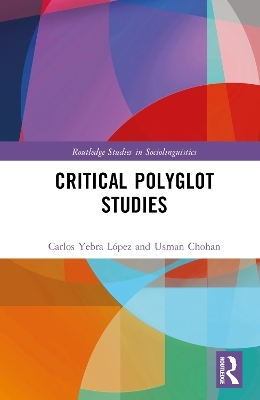
Critical Polyglot Studies
Routledge (Verlag)
978-1-032-69774-1 (ISBN)
- Noch nicht erschienen (ca. März 2025)
- Versandkostenfrei
- Auch auf Rechnung
- Artikel merken
This book offers a self-reflective, critical approach to the study of what is popularly known as polyglossia, charting the gradual but marked process of its commoditization over the last 20 years and offering a counterpoint to mainstream positivist treatment of serial language learning.
First, from a diagnostic standpoint, the book examines the rise and consolidation of the Polyglot Community in the sociopolitical and economic context of its gradual transformation into and partial overlap with the Polyglot Industry and its ideological tenets (the Polyglot Matrix). Second, from a prognostic standpoint, the book posits Critical Polyglot Studies (CPS) as a much-needed counter to the many theoretical and practical shortcomings of the Polyglot Industry-cum-Matrix, presenting the main programmatic points and illustrative best practices and institutional case studies of this alternative paradigm. CPS is conceived as both a research orientation and as a strategic attempt to elicit debate and draw in a wider range of polyglossia scholars, offering readers with actionable tools to contribute to this emerging academic and activist endeavor.
Constituting the first critical and systematic analysis of polyglossia as a globalized phenomenon, this book will be of interest to scholars of linguistics, cultural studies, critical theory, and sociology.
Carlos Yebra López is Assistant Professor of Spanish Linguistics at California State University, Fullerton. He is also founder of The Hyperpolyglot Activist and Ladino 21 Community Interest Company, and the Director of Research at The International Association of Hyperpolyglots (HYPIA). Usman W. Chohan is an international academic who serves as Advisor on Economic Affairs and National Development at the Centre for Aerospace & Security Studies (CASS), one of Pakistan’s premier research-based think tanks, where he was a founding director. He is also the founder and serves as President of the International Association of Hyperpolyglots (HYPIA), the largest association of hyperpolyglot language speakers in the world.
Contents
List of Tables
List of Figures
List of Acronyms
Preface
Chapter 1: Introduction
Introduction
Exposing the Colonial Origins
and Mediation of Mainstream
Polyglossia
Rethinking Polyglossia as a
North Atlantic Universal
Enter the Polyglot Community
The (D)evolution of the Polyglot
Community into the Polyglot
Industry-cum-Matrix
The Case for Critical Polyglot
Studies
CPS’ Theoretical, Methodological and
Normative Commitments *
Theory
Ontology
Epistemology
Methodology
Normativity
Outline of this Book
Chapter Division
Part 1: The Polyglot Industry: A Cartography
Chapter 2: The Polyglot Community: Genealogy and Nature
Introduction
Enter Polyglossia: Commoditizing an
Ethnonational Identity Marker
(Neo)colonial/Ethnonational
Rationality
The (Neo)colonial/Ethnonational
Partial Shift towards and Overlap
with Neoliberalism
Enter The Polyglot Community: General
Normative Idea and Material Conditions
The Mid-to-Late 1990s: From
Internet Relay Chat to the World
The 2000s: The Early YouTube
‘Polyglots’ and the Tension
between Showmanship and
Community Building
The 2010s: The Road to ‘Global’
Hybridity
Conclusion
Chapter 3: The Polyglot Industry: Experts and Institutions
Understanding the Polyglot Industry: When,
Why, and How it Works
Commercializing the Polyglot Community’s
Attention
The rise of the attention economy
The Fourth Screen: Web 2.0 and the
Smartphones (2010s to Present)
Social networks
YouTube
Facebook
Italki
X (Twitter)
Language Learning Platforms
Duolingo
Glossika
uTalk
How Language Learning
Platforms and Social
Networks Converge
'Polyglot' Gatherings
Polyglot Events (annual)
Polyglot Meetings (weekly)
How Polyglot Gatherings Converge
with Social Networks, Language
Learning Apps and Print Media
Print Media
1950 to 1995: Polyglossia avant
la lettre
Mid 1990s-2005: Early Recognition
and Exploration
2005-2015: The Rise and
Consolidation of Print Media as a
Polyglot Industry Sector
2015 to present: Diversity, Inclusion,
Hyperpolyglossia and AI
Conclusion: Saving the Polyglot Community from the
Language-Industrial Complex
Chapter 4: The Polyglot Matrix: The Ideology of the Polyglot Industry
Introduction
Polyglot Matrix Myths
Myth #1: (Non)nativespeakerism
(Neo)colonialism/Ethnonationalism
Performativity
Beyond (Non)native-speakerism
L1 Speakers as Role Models,
L1+n Speakers as Deficient
Myth #2: Accentism
Myth #3: Foreignness
Myth # 4: Thinking in Languages
Myth # 5: Languages as Countable
Myth # 6: Code-switching
Myth # 7: Neo-Whorfianism
Myth # 8: Flaggism
Myth # 9: Multilingual exceptionalism
Myth # 10: Causation Between Polyglossia
and Tolerance
Conclusion
Part 2: Critical Polyglot Studies: A Roadmap
Chapter 5: Programmatic Points and Best Practices
Programmatic Points
Theory
Ontology
Epistemology
Methodology
Political Economy
Normativity
Best Practices
Social Networks
Language Learning Applications
Polyglot Meetings
Print Media
Conclusion
Chapter 6: Institutional Case Studies
The Hyperpolyglot Activist
Introduction
Positioning vis-à-vis
the Hegemonic
Rationalities
Polyglot Industry
Intervention
Polyglot Matrix
Intervention
HYPIA: The International Association
of Hyperpolyglots
Introduction
Positioning vis-à-vis
the Hegemonic
Rationalities
Polyglot Industry
Intervention
Polyglot Matrix
Intervention
Final Words
Index
| Erscheint lt. Verlag | 18.3.2025 |
|---|---|
| Reihe/Serie | Routledge Studies in Sociolinguistics |
| Zusatzinfo | 4 Tables, black and white; 5 Line drawings, black and white; 5 Illustrations, black and white |
| Verlagsort | London |
| Sprache | englisch |
| Maße | 152 x 229 mm |
| Themenwelt | Geisteswissenschaften ► Philosophie ► Sprachphilosophie |
| Geisteswissenschaften ► Sprach- / Literaturwissenschaft ► Sprachwissenschaft | |
| ISBN-10 | 1-032-69774-1 / 1032697741 |
| ISBN-13 | 978-1-032-69774-1 / 9781032697741 |
| Zustand | Neuware |
| Informationen gemäß Produktsicherheitsverordnung (GPSR) | |
| Haben Sie eine Frage zum Produkt? |
aus dem Bereich


